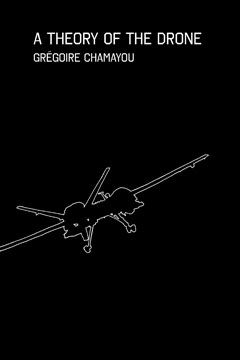
A Theory of the Drone
کتاب های مرتبط
- اطلاعات
- نقد و بررسی
- دیدگاه کاربران
نقد و بررسی

November 17, 2014
Having created a stir with his 2012 title, Manhunts: A Philosophical History, Chamayou, research scholar at the Centre National de la Recherche Scientifique in Paris, delivers a philosophical investigation into the subject of drones, revealing many insights to readers willing to put in the work. Chamayou stresses that unmanned aircraft armed with missiles have converted war from a duel between two fighters to a simple manhunt: “People die but only on one side.” The U.S., a nation that cherishes soldiers’ lives perhaps too much, now trains more drone operators than pilots of fighters and bombers combined. Drone warfare led the U.S. to discard its commitment to counterinsurgency—which aimed to win over a population—and replace it with an antiterrorism policy that simply aimed to kill insurgents. Chamayou warns repeatedly of the moral hazards involved, and emphasizes that allowing actions to be taken without consequences encourages riskier behavior (in the case of drones, riskier to those where drones are operating). He suggests that as the U.S. enthusiastically smites supposed enemies in nations where we are officially at peace (Pakistan, Somalia, Yemen), it slides well down that slippery slope. Chamayou has produced a thought-provoking reference for scholars and military officers, but it’s heavy going for the general reader.

November 15, 2014
If you are what you eat, then you are also what you kill with. Q.E.D.The idea that there might be a philosophical theory behind, or at least something philosophical to say about, the use of remote-controlled weapons is a very French one: In this instance, it's not so much the Montaigne-born drive to understand the world as the Barthesian one of fearing letting something obvious go by unremarked. Chamayou, a "research scholar in philosophy," gamely codifies what has gone unsaid: In war, soldiers have to draft a narrative that turns the moral violation of killing into a "virtue, not something prohibited." This is easier done, by his suggestion, when one is looking into the eye of the enemy. But what of the drone operators, tucked safely away in a bunker in the desert? Well, they are "in a sense both in the rear and at the front, caught up in two very different moral worlds that pull their lives this way and that." Nonetheless, the military has admitted that some drone operators far from the front have to be treated for PTSD. "If it is true that weapons constitute the essence of combatants," the author writes, that begs the question, "what is the essence of those who fight using drones?" The implication: A machine, of course, which makes the state behind the murderous technology a sort of machine, as well. In the end, having been treated to a light survey of the ethos of mechanized war, readers are left with the sense that this is the product of someone who must enjoy the unhurried leisure of not being chased around by one of the killing machines he's writing about-a first-world ponderer of third-world problems, perhaps. Chamayou does land some good points in this rather arid exercise, but one would rather have a Camus than a Derrida on this point.
COPYRIGHT(2014) Kirkus Reviews, ALL RIGHTS RESERVED.

January 1, 2015
Chamayou, a research scholar at the Centre National de la Recherche Scientifique, France's largest government research organization, wrote this book to make the case that in the pursuit of "warfare without risk," armed, unmanned aerial vehicles (UAV) contradict just about everything morally and legally associated with conventional warfare. The book is a logical extension of issues the author raised in his previous work, Manhunts, about the hunting of humans in its various forms, here specifically applied to military drones. It subjects drone warfare to a moral philosophical analysis focusing mainly on the present Leviathan-like state of the weapon being in the hands of one dominant party in the conflict. Chamayou argues that drones are essentially a coward's weapon; that the nature of the technology changes the terms of warfare between two otherwise equal combatants into a dynamic of hunter and hunted. How, for instance, can drone warfare even be identified as such if ultimately the drone removes one of the combatants from the field of battle? VERDICT It is hard to take issue with these points, although one might find similar ones addressed in Medea Benjamin's Drone Warfare: Killing by Remote Control, which explores the implications that such conflict may not always be one sided. Readers might also consider John Kaag and Sarah Kreps's Drone Warfare. Recommended for public and academic libraries.--Jeffrey J. Dickens, Southern Connecticut State Univ. Libs., New Haven
Copyright 2015 Library Journal, LLC Used with permission.

























دیدگاه کاربران